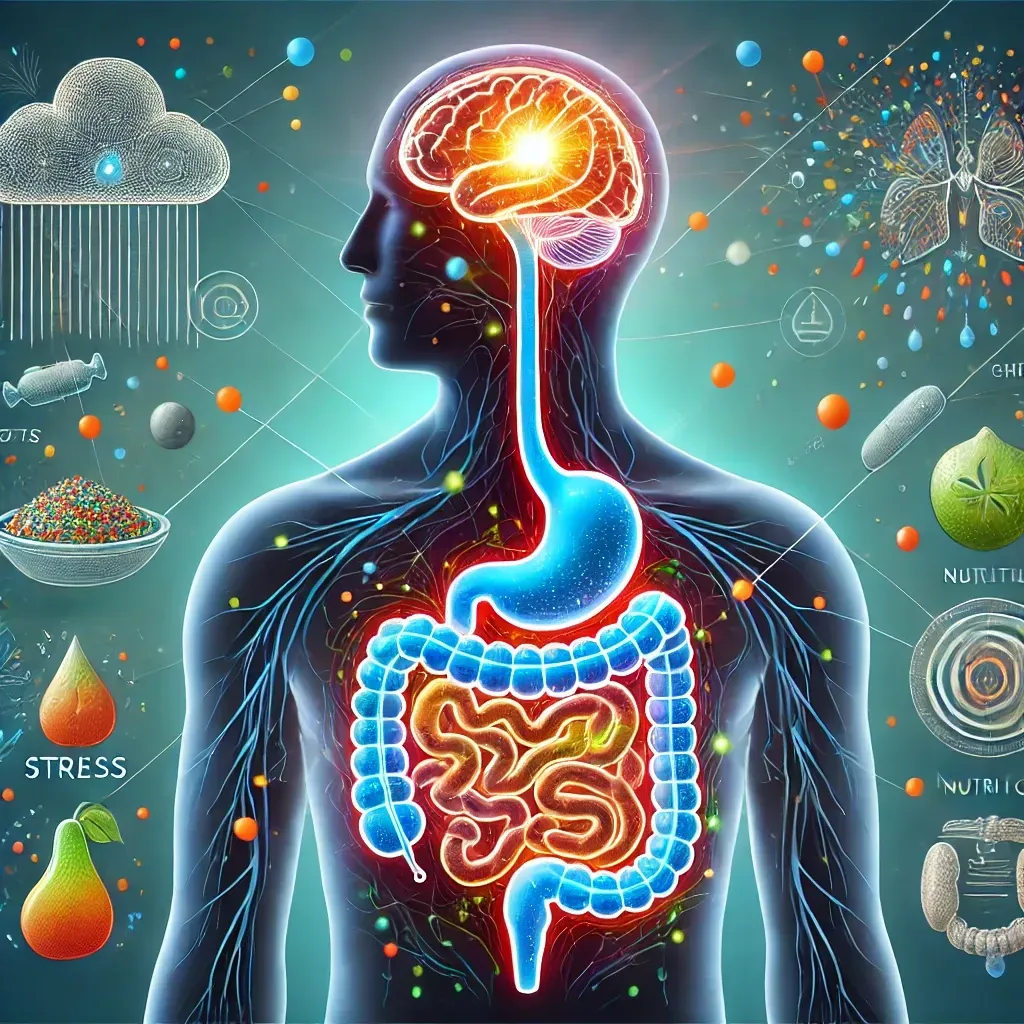Subscribe to the
Newsletter
Join our loyal subscribers and get regular emails on Gut Health, Stress Management, Nutritional Strategies and Health Habits.
Newsletter Library

Your Gut: The Theatre of Your Emotions
Your Gut: The Theatre of Your Emotions
Have you ever had a "gut feeling" about something? Or felt "butterflies" before a big moment? These expressions aren’t just figures of speech—they reflect a deep, scientific reality. Your gut and brain are in constant communication, and this connection plays a pivotal role in your mood, digestion, and overall health.
For those experiencing stress-related digestive issues, including irritable bowel syndrome (IBS), understanding this gut-brain relationship is the key to reclaiming control over your health. The foods you eat, the stress you endure, and even your mindset all shape the environment within your gut. So, let’s break it down: how does your brain influence your stomach, and what can you do to foster a healthier digestive system?
The Gut-Brain Axis: A Two-Way Street
The gut and brain are connected by the vagus nerve, a superhighway that allows constant communication between your central nervous system and your digestive system. This connection, known as the gut-brain axis, explains why emotional distress can lead to digestive discomfort and vice versa.
When you experience stress, your brain sends signals to your gut, altering its function. Your body enters a fight-or-flight mode, prioritizing survival over digestion. This can lead to changes in gastric acid production, slower or faster movement of food through the digestive tract, and shifts in the microbiome that may contribute to bloating, cramping, or IBS symptoms.
How Stress Impacts Digestion
Stress triggers a cascade of hormonal responses, starting with the release of cortisol, the body's primary stress hormone. This has several consequences for your digestive system:
Altered Gastric Juices: Chronic stress can lead to too much or too little stomach acid, contributing to heartburn, indigestion, or bacterial overgrowth.
Slowed or Sped Up Motility: Some people experience constipation as their digestive system slows down, while others may suffer from diarrhea due to an accelerated transit time.
Increased Gut Permeability: Stress weakens the gut lining, leading to "leaky gut," where undigested food particles and toxins enter the bloodstream, potentially triggering inflammation and food sensitivities.
The Role of Diet in the Gut-Brain Connection
Just as stress affects the gut, so do the foods we eat. The gut is home to trillions of bacteria creating your microbiome, which plays a critical role in digestion, immune function, and even mood regulation.
When we consume processed, sugary, or inflammatory foods, we disrupt this delicate balance, leading to a weakened gut barrier, increased inflammation, and altered gut motility. Here’s how different foods impact digestion:
Ultra-processed foods (high in additives and refined sugars) can feed harmful bacteria, increasing inflammation and leading to bloating and discomfort.
High-fat meals (especially unhealthy fats) slow digestion, causing sluggish bowel movements and bloating.
Fermented foods (like kimchi, sauerkraut, and yogurt) support gut health by replenishing beneficial bacteria, improving digestion, and reducing inflammation.
Fiber-rich foods (vegetables, whole grains, legumes) fuel good bacteria and promote healthy bowel movements.
The Microbiome: Your Second Brain
Your gut houses over 100 trillion bacteria, which directly influence the production of neurotransmitters like serotonin and dopamine, chemicals responsible for mood, motivation, and well-being. In fact, over 90% of serotonin is produced in the gut, which is why imbalances in gut bacteria can contribute to anxiety, depression, and cognitive fog.
To nurture your microbiome:
Eat a variety of plant-based foods to diversify your gut bacteria.
Avoid excessive antibiotics and artificial sweeteners, which can disrupt microbial balance.
Consume prebiotics (fiber-rich foods) and probiotics (fermented foods) to support beneficial bacteria.
Reclaiming Gut Health: Practical Strategies
If you’ve been dealing with gut-related anxiety, IBS, or digestive discomfort, here are some steps to restore balance:
Manage Stress with Mindfulness & Movement: Meditation, deep breathing, and regular exercise activate the parasympathetic nervous system, reducing gut inflammation and improving motility.
Eat Mindfully: Slow down, chew thoroughly, and avoid eating in stressful environments to support optimal digestion.
Prioritise Gut-Friendly Foods: Add fiber, fermented foods, and nutrient-dense meals to support your microbiome and digestive function.
Hydrate & Sleep Well: Dehydration and poor sleep contribute to sluggish digestion and increased gut permeability.
Consider Supplementation: If needed, digestive enzymes, probiotics, and gut-supporting nutrients like L-glutamine can help heal and strengthen the gut lining.
Final Thoughts
Your gut isn’t just a digestive organ - it’s an emotional and cognitive powerhouse that reflects what’s happening in your brain. When you nourish your microbiome, reduce stress, and fuel your body with the right foods, you create an internal environment where both your mind and body can thrive.
So, the next time you’re feeling stressed, anxious, or out of balance, don’t just focus on your thoughts, pay attention to your gut. Because when you take care of your digestive system, you’re taking care of your brain, your immune system, and ultimately, your entire well-being.
